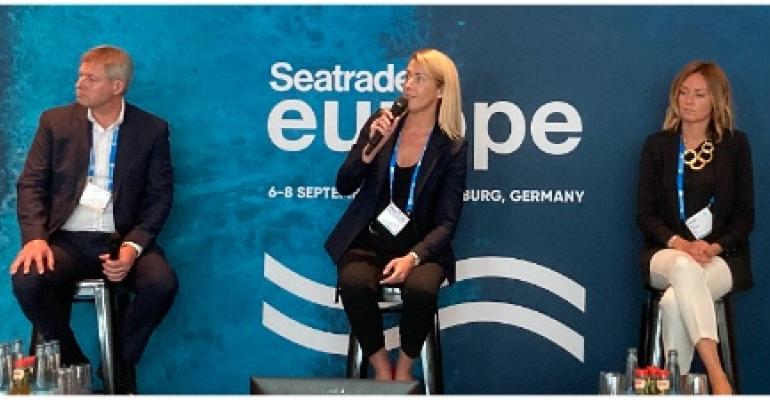IG RiverCruise represents the owners and managers of 365 European vessels, or 90% of the market.
The MOU is tying ocean and river cruise operators closer together to reduce emissions. Challenges faced by both include the need for sustainable marine fuel, enhanced port infrastructure and new technologies, as well as a regulatory environment that fosters investment, allowing energy decisions to be taken in due time.
Focus on data sharing, research and development
The new cooperation was revealed at CLIA's Port & Destination Dialogue in Hamburg on Tuesday. The parties plan a joint meeting Oct. 18.
CLIA and IG RiverCruise defined three fields for cooperation: the exchange of information to ensure the regulatory environment supports sustainable growth of river cruising in Europe, sharing of environmental data and industry research to articulate the benefits of cruising to the blue economy and collaboration on research and development and innovation priorities.
Speaking at a session about ESG goals at Seatrade Europe in Hamburg on Wednesday, IG RiverCruise VP Daniel Buchmüller welcomed the cooperation.
Lack of shore power at river and ocean ports
Julie Higgins, director of hotel operations & sustainability officer at Uniworld, illustrated how ocean and river sectors face common challenges: fewer than 20% of river ports are able to supply shore power. Along the Danube, it is virtually unavailable at any destination east of Austria.
On Wednesday morning, CLIA Global Chairman Pierfrancesco Vago had lamented that no more than 32 ports are currently equipped with cold ironing worldwide, including 13 in Europe. Higgins voiced regret that current regulations do not allow inland river vessels to operate on gas, while inland cargo vessels (and ocean passenger vessels) may.
Rivers might serve as testing ground for new technologies
While regulations have prevented the river cruise sector from a pioneering role in the application of LNG, Maria Garbarini, head of the Passenger Ships Excellence Centre at the Italian classification society RINA, suggested river vessels could become testing ground for different alternative fuels and new technologies since safety aspects are more under control with these ships always at close reach.
Also, their smaller size and shorter voyages make river vessels a preferred choice for testing new technology, Garbarini said. She referred to projects for hydrogen-fuelled inland cargo vessels involving RINA. Two of these pioneering ships, including Antonie with a 320 kW fuel cell and 1,100 kWh battery packs, are expected to be built.
Shared EU Green Deal framework
Despite regulatory differences in detail, the framework for ocean and river cruise operators in Europe is similar, with the objectives set by the EU Green Deal with the objective to supply (and mandate the use of) shore power in TEN-T ports from 2030.
On the technical side, many similarities likewise exist, but there are differences as well. In particular, the size of river vessels is much more limited than oceangoing cruise ships, leaving little room to accommodate additional technical components or more space-consuming fuel.
Copyright © 2024. All rights reserved. Seatrade, a trading name of Informa Markets (UK) Limited.
Add Seatrade Cruise News to your Google News feed.  |

